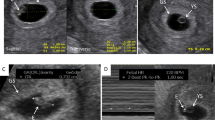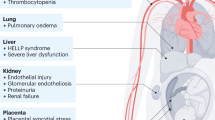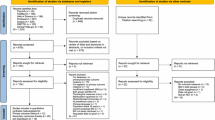Abstract
Objective:
To describe the psychosocial burden of hyperemesis gravidarum (HG) in a large cohort of affected women, focusing on previously unreported problems.
Study Design:
Women with HG described their pregnancy history in an open-ended survey administered internationally through an HG website during 2003 to 2005.
Result:
Of the 808 participants, 626 (77.5%) were American. A large majority (82.8%) reported that HG caused negative psychosocial changes, consisting of (1) socioeconomic changes, for example, job loss or difficulties, (2) attitude changes including fear regarding future pregnancies and (3) psychiatric sequelae, for example, feelings of depression and anxiety, which for some continued postpartum. Women who reported that their health-care provider was uncaring or unaware of the severity of their symptoms were nearly twice as likely to report these psychiatric sequelae (odds ratio 1.86, 95% confidence interval 1.06 to 3.29, P=0.032).
Conclusion:
Over 80% of a large cohort of women with HG reported that HG caused a negative psychosocial impact.
This is a preview of subscription content, access via your institution
Access options
Subscribe to this journal
Receive 12 print issues and online access
$259.00 per year
only $21.58 per issue
Buy this article
- Purchase on Springer Link
- Instant access to full article PDF
Prices may be subject to local taxes which are calculated during checkout
Similar content being viewed by others
References
Jarnfelt-Samsioe A . Nausea and Vomiting in pregnancy: a review. Obstet Gynec Surv 1987; 41 (7): 422–426.
Fairweather DV . Nausea and vomiting in pregnancy. Am J Obstet Gynecol 1968; 102 (1): 135–175.
Goodwin TM . Hyperemesis gravidarum. Clin Obstet Gynecol 1998; 41 (3): 597–605.
Association of Professors of Gynecology and Obstetrics. Nausea and Vomiting of Pregnancy. Educational Series on Women's Health Issues. ACOG: Crofton, MD, 2001.
Hill JB, Yost NP, Wendel Jr GD . Acute renal failure in association with severe hyperemesis gravidarum. Obstet Gynecol 2002; 100 (5 Part 2): 1119–1121.
Dodds L, Fell DB, Joseph KS, Allen VM, Butler B . Outcomes of pregnancies complicated by hyperemesis gravidarum. Obstet Gynecol 2006; 107 (2 Part 1): 285–292.
Bashiri A, Neumann L, Maymon E, Katz M . Hyperemesis gravidarum: epidemiologic features, complications and outcome. Eur J Obstet Gynecol Reprod Biol 1995; 63 (2): 135–138.
Bailit JL . Hyperemesis gravidarum: epidemiologic findings from a large cohort. Am J Obstet Gynecol 2005; 193 (3 Part 1): 811–814.
Adams MM, Harlass FE, Sarno AP, Read JA, Rawlings JS . Antenatal hospitalization among enlisted servicewomen 1987–1990. Obstet Gynecol 1994; 84 (1): 35–39.
Gazmararian JA, Petersen R, Jamieson DJ, Schild L, Adams MM, Deshpande AD et al. Hospitalizations during pregnancy among managed care enrollees. Obstet Gynecol 2002; 100: 94–100.
Jiang HG, Elixhauser A, Nicholas J, Steiner C, Reyes C, Brierman AS . Care of women in US Hositals, 2000. Agency for Healthcare Research and Quality: Rockville, MD, 2002 HCUP Fact Book No. 3. AHRQ Pub. No. 02-0044.
Gadsby R, Barnie-Adshead AM, Jagger C . A prospective study of nausea and vomiting during pregnancy. Br J Gen Pract 1993; 43 (371): 245–248.
Vellacott ID, Cooke EJA, James CE . Nausea and vomiting in early pregnancy. Int J Gynaecol Obstet 1988; 27 (1): 57–62.
O’Brien B, Naber S . Nausea and vomiting during pregnancy: effects on the quality of women's lives. Birth 1992; 19 (3): 138–143.
Attard CL, Kohli MA, Coleman S, Bradley C, Hux M, Atanackovic G et al. The burden of illness of nausea and vomiting of pregnancy in the United States. Am J Obstet Gynecol 2002; 186 (5 Suppl): S220–S227.
Chandra K, Magee L, Koren G . Discordance between physical symptoms versus perception of severity by women with nausea and vomiting of pregnancy (NVP). BMC Pregnancy Childbirth 2002; 24 (2): 71–75.
Mazzotta P, Stewart D, Atanackovic G, Koren G, Magee LA . Psychosocial morbidity among women with nausea and vomiting of pregnancy: prevalence and association with anti-emetic therapy. J Psychosom Obstet Gynecol 2000; 21 (3): 129–136.
Tylden E . Hyperemesis and physiological vomiting. J Psychosom Res 1968; 12 (1): 86–93.
EL-Mallakh RS, Liebowitz NR, Hale MS . Hyperemesis gravidarum as conversion disorder. J Nerv Ment Dis 1990; 178 (10): 655–659.
Lingam R, McCulskey S . Eating disorders associated with hyperemesis gravidarum. J Psychosom Res 1996; 40 (3): 231–234.
Katon WJ, Ries RK, Bokan JA, Kleinman A . Hyperemesis gravidarum: a biopsychosocial perspective. Int J Psychol Med 1980; 10 (2): 151–161.
Munch S, Schmitz MF . Hyperemesis gravidarum and patient satisfaction: a path model of patients’ perceptions of the patient-physician relationship. J Psychosom Obstet Gynecol (271); 2006: 49–57.
Simpson SW, Goodwin TM, Robins SB, Rizzo AA, Howes RA, Buckwalter DK et al. Psychological factors and hyperemesis gravidarum. J Womens Health Gend Based Med 2001; 10 (5): 471–477.
Flaxman SM, Sherman PW . Morning sickness: a mechanism for protecting mother and embryo. Q Rev Biol 2000; 75: 113–148.
Zhang J, Cai WW . Severe vomiting during pregnancy: antenatal correlates and fetal outcomes. Epidemiology 1991; 2: 454–457.
Acknowledgements
This research was supported in part by the Intramural Research Program of the National Institute of Child Health and Human Development, National Institute of Health, Department of Health and Human Services.
Author information
Authors and Affiliations
Corresponding author
Appendix A
Appendix A
Survey questions relevant to this study.
-
1
What was your health provider's attitude toward hyperemesis care and you?
-
a)
Overall very supportive and helpful
-
b)
Eventually realized how sick I was and helped me
-
c)
Did not understand how sick I was
-
d)
Overall not sympathetic or caring
-
a)
-
2
What specific treatments were offered for hyperemesis?
-
3
How has your life or future plans changed after experiencing hyperemesis?
Rights and permissions
About this article
Cite this article
Poursharif, B., Korst, L., Fejzo, M. et al. The psychosocial burden of hyperemesis gravidarum. J Perinatol 28, 176–181 (2008). https://doi.org/10.1038/sj.jp.7211906
Received:
Revised:
Accepted:
Published:
Issue Date:
DOI: https://doi.org/10.1038/sj.jp.7211906
Keywords
This article is cited by
-
“Echoes of a dark past” is a history of maternal childhood maltreatment a perinatal risk factor for pregnancy and postpartum trauma experiences? A longitudinal study
BMC Pregnancy and Childbirth (2023)
-
Assessment of management approaches for hyperemesis gravidarum and nausea and vomiting of pregnancy: a retrospective questionnaire analysis
BMC Pregnancy and Childbirth (2022)
-
Hyperemesis Gravidarum in the context of migration: when the absence of cultural meaning gives rise to “blaming the victim”
BMC Pregnancy and Childbirth (2019)
-
Nausea and vomiting of pregnancy and hyperemesis gravidarum
Nature Reviews Disease Primers (2019)
-
The association between the degree of nausea in pregnancy and subsequent posttraumatic stress
Archives of Women's Mental Health (2019)



